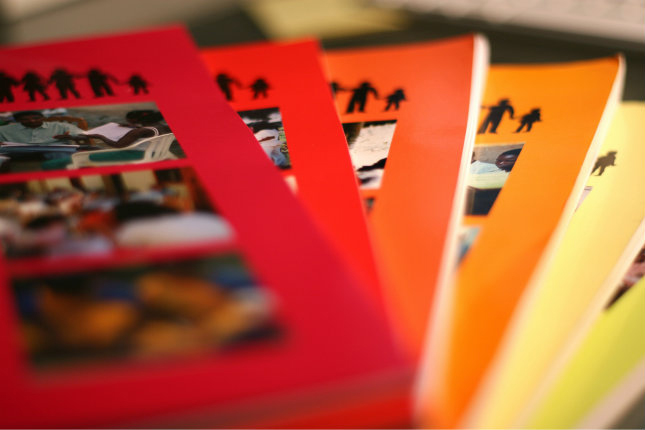The views expressed in our content reflect individual perspectives and do not represent the authoritative views of the Baha'i Faith.
That one indeed is a man who, today, dedicateth himself to the service of the entire human race. The Great Being saith: Blessed and happy is he that ariseth to promote the best interests of the peoples and kindreds of the earth. – Baha’u’llah, Tablets of Baha’u’llah, p. 167.
Truth inspires altruism.
After reading a few articles on BahaiTeachings.org, some of you might ask: “Okay, what next?” Or: “Sounds interesting. But what are Baha’is doing to change the world?”
Fair questions. One answer is that the Baha’i Faith offers a systematic approach to bringing about world peace and unity, from family relations to international relations. (See, for instance, “50 Baha’i Principles of Unity.”)
Baha’is have a toolbox of social tools that can make small changes in society—incremental yet cumulative. “How?” you may ask?
Well, the slowest, yet surest, way of changing the world is by changing how people think.
Think about it. Don’t all actions flow from decisions? Aren’t decisions a reflex of one’s willpower? Isn’t the will to act the result of thoughts of mind and feelings of heart?
One of the tools that Baha’is use to improve self and society is called a “study circle.”
Simple, yet profound. A child could do it. Some children do. Here’s how it works:
A study circle is a small group of individuals, who decide to find out more about the Baha’i Faith. As a prime example, let’s take the first of a sequence of study circles: “Reflections on the Life of the Spirit.”
No grades. No tests. No cost. No clergy. Just the love of learning, and learning to love.
A tutor facilitates group study and discussion.
“Reflections on the Life of the Spirit” study circles cover three major topics: (1) “Understanding the Baha’i Writings”; (2) “Prayer”; and (3) “Life and Death.”
As you can see, this first study circle (referred to as “Book 1” of the “Ruhi Institute” curriculum) offers a portal into Baha’i scriptures, which offer principles and guidelines for making this world a better place.
The Baha’i study circles build capacity in three major ways:
- in the mind, offering thoughts and ideas as tools to distinguish between truth and falsehood, greater good and lesser good;
- in the heart, transforming one’s innermost feelings into compassion for others; and
- in the will, inspiring lofty intentions to be of service to others through one’s actions.
The three major units in “Reflections on the Life of the Spirit” have three objectives.
In the first unit, “Understanding the Baha’i Writings,” participants learn how to read and meditate on the deep spiritual content of the Baha’i teachings.
In the second section, on “Prayer,” participants develop the practice of daily prayer, in order to elevate one’s thoughts and desires—instead of simply asking for one’s wishes to be granted, since God is not Santa Claus. From a Baha’i perspective, prayer increases spiritual capacity, which leads to self-empowerment, which helps bring about the conditions necessary for spiritual growth:
Know thou, verily it is becoming in a weak one to supplicate to the Strong One, and it behooveth a seeker of bounty to beseech the Glorious Bountiful One. When one supplicates to his Lord, turns to Him and seeks bounty from His Ocean, this supplication brings light to his heart, illumination to his sight, life to his soul and exaltation to his being.
During thy supplications to God… consider how thine heart is cheered, thy soul delighted by the spirit of the love of God, and thy mind attracted to the Kingdom of God! By these attractions one’s ability and capacity increase. When the vessel is enlarged the water increases, and when the thirst grows the bounty of the cloud becomes agreeable to the taste of man. This is the mystery of supplication and the wisdom of stating one’s wants. – Abdu’l-Baha, Baha’u’llah and the New Era, pp. 93-94.
In the third and final unit of the study circle on “Life and Death,” the objective is to “understand that life is not the changes and chances of this world, and its true significance is found in the development of the soul.”
From the fusion of heart and mind in the spiritual consciousness gained from the experience of prayer and meditation, the will to be of service receives its best inspiration and impetus.
Ruhi, Book 1, is not a catechism. It’s part of the Baha’i toolkit for making the world a better place, by first making your own world a better place.
The world will change slowly. But, in the future, it will change suddenly—when there is a “sea change” of consciousness, when multitudes of people around the world are spiritualized and view self and society in a new, worldwide light.
When the social Mind, Heart and Will are infused with the consciousness of world unity, with the compassion of caring about the world as a whole, and with the will to come together to solve the world’s problems, then such tools, as described above, will have played their part in building what the Rev. Martin Luther King, Jr. called the “world house.”
To give you a preview of what’s ahead, Ruhi Institute, Book 2, is entitled, “Arising to Serve.” The theme of service runs throughout the rest of the sequence of Baha’i study circles.
Altruism is “truth for all.” Baha’is refer to altruism as simply “service to others”:
The “Master Key” to self-mastery is self-forgetting. The road to the palace of life is through the path of renunciation. . . . Today the confirmations of the Kingdom of Abha are with those who renounce themselves, forget their own opinions, cast aside personalities and are thinking of the welfare of others. – Abdu’l-Baha, Star of the West, Vol. XVII, p. 348.
So, if you’re truly interested in finding out more about the Baha’i Faith, why not also take the opportunity to experience part of Baha’i community life by contacting your local Baha’i community to request information on joining a Baha’i study circle, where you can reflect on the life of your spirit and on the spirit and welfare of others.

















Comments
Sign in or create an account
Continue with Googleor